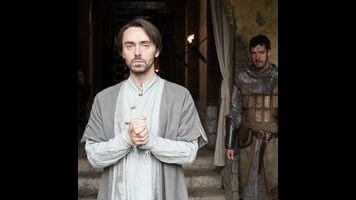The epic but human The Last Kingdom proves there’s always room for more Vikings

BBC America’s sprawling, arresting eight-part historical miniseries The Last Kingdom proves that there’s room enough on television for more than one Viking invasion. The Vikings of The Last Kingdom are running roughshod over poor ninth-century England, raiding the country’s fractious kingdoms more or less with impunity. Captured on a raid on his father’s realm by a Norse raiding party led by Earl Ragnar (Peter Gantzler), the young nobleman Uhtred of Bebbanburg (played as a child by Tom Taylor, thereafter by Alexander Dreymon) is raised by his captors, eventually being adopted and raised by the occupying Norse clan. When, as an adult, he finds himself on his own, he’s taken under the wing of English king Alfred (later Alfred The Great, played by David Dawson) who seeks to use the strapping Uhtred’s knowledge of Viking society and tactics to drive the Norse out and unite all the English kingdoms under one (i.e. Alfred’s) rule.
Based on the still-ongoing series of historical novels by Bernard Cornwell, The Last Kingdom, while no doubt engendered by the surprise success of those other Vikings on History, finds its own take on the period, following Uhtred’s perilous journey through one of the most tumultuous and deadly eras in English history. (The Last Kingdom takes place approximately a hundred years after Vikings’ Vikings first raided English shores, so, while there are two Ragnars here, neither is Vikings’ Ragnar Lothbrok.) Freed from Vikings’ nimble balancing act of keeping its conquerors conventionally sympathetic as they rape and pillage, The Last Kingdom (from Downton Abbey producers Gareth Neame and Nigel Marchant) is free to present a more brutally frank Norse People—their treatment of prisoners after the sack of Bebbanburg is especially upsetting in its casual cruelty. But the show—while at least partly intended as a rousing tale of English unity—is hardly a propaganda piece, with the brilliant but manipulative Alfred and his subjects prone to extreme acts of cruelty and prejudice in the name of their God. Indeed, as with any Viking story, the character’s straightforward, often alien morality holds undeniable fascination—in the brutal world vividly presented here, their methods of survival emerge as valid as any other.
Alexander Dreymon is a canny choice for Uhtred. Depicted as brave and skilled in battle but no visionary, the boyishly bearded Uhtred may lack the eerie magnetism of his Vikings counterpart Ragnar, but, in keeping with The Last Kingdom’s more earthy take on the period, Uhtred’s exploits appear less like those of a man ahead of his time, and more like a man without options improvising ways to stay alive. Luckily for him (and the viewer), Uhtred’s got backup in the form of Brida (Emily Cox, stealing scenes), his childhood-friend-turned-lover, whose lusty, pragmatic counsel provides him with checks to his often foolhardy ambitions. She proves herself a formidable, often deadly ally. And a funny one: Cox’s no-nonsense earthiness provides much of the show’s welcome humor. (Her humiliation of a contemptuous captive Viking is especially… inventive.) While Uhtred’s single-minded quest to stay alive (and regain his birth family’s lands) trumps much thought of his divided cultural loyalties, Cox’s Brida—like Uhtred, a captured English child adopted into Ragnar’s family—feelingly wrestles with what she sees as Uhtred’s betrayal of the Norse when he offers Alfred his services.
The inevitable comparisons to Vikings are illustrative, as The Last Kingdom, while as scrupulously grubby and lived-in, continually emphasizes the everyday cruelty of life in its embattled England. The machinations of Alfred’s rise to power are less flamboyantly rendered than Vikings’ often melodramatically arch English, with David Dawson’s performance as the sickly but ambitious king finding the right notes of manipulativeness without ever tipping either into stifling nobility or outright villainy. The cast is uniformly solid, including Ian Hart as Uhtred’s childhood priest and friend, who warily eyes the unpredictable man his former charge has become, Rune Temte as fearsome and superstitious Norse leader Ubba, Gantzler’s Ragnar, embodying the contradictions in the Norse soul with burly good humor, and a juicy, understated turn from Rutger Hauer, as Ragnar’s blind, wise father.
There’s a historical sweep to The Last Kingdom that requires its characters, regardless of culture or station, to keep their feet firmly planted on its world’s mucky ground. The show’s many battle scenes play out in bloody, muddy confusion that’s nonetheless rendered with reliable clarity of storytelling, and, while Uhtred’s position as a hero torn between two worlds is central, it’s also not elevated much above the larger context of the story the show tells so consistently well.
Created by: Gareth Neame and Nigel Marchant
Starring: Alexander Dreymon, Emily Cox, Ian Hart, David Dawson, Rune Temte
Debuts: Saturday, October 10 at 10 p.m. Eastern on BBC America
Format: Historical miniseries
Six episodes watched for review
Reviews by Kyle Fowle will run weekly.